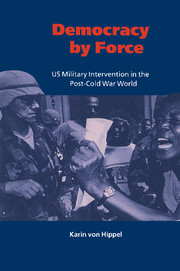Book contents
- Frontmatter
- Contents
- List of maps
- Acknowledgements
- List of abbreviations
- 1 Introduction: dangerous hubris
- 2 Invasion or intervention? Operation Just Cause
- 3 Disappointed and defeated in Somalia
- 4 Heartened in Haiti
- 5 UNPROFOR, IFOR and SFOR: can peace be FORced on Bosnia?
- 6 Hubris or progress: can democracy be forced?
- Bibliography
- Index
4 - Heartened in Haiti
Published online by Cambridge University Press: 22 September 2009
- Frontmatter
- Contents
- List of maps
- Acknowledgements
- List of abbreviations
- 1 Introduction: dangerous hubris
- 2 Invasion or intervention? Operation Just Cause
- 3 Disappointed and defeated in Somalia
- 4 Heartened in Haiti
- 5 UNPROFOR, IFOR and SFOR: can peace be FORced on Bosnia?
- 6 Hubris or progress: can democracy be forced?
- Bibliography
- Index
Summary
Operation Uphold Democracy, the misnomer for the US-led military intervention in Haiti, has entered the post-Cold War political lexicon, reflecting the recent prominence enjoyed by advocates of democratisation. Of greater significance is the precedent set when the UN Security Council formally sanctioned the use of force to implant – or ‘uphold’ – democracy by invoking Chapter VII of the UN Charter. While the Somalia intervention challenged the non-interventionary norm because of the humanitarian pretext, international approval of the denial-of-democracy excuse in Haiti advanced this process even further. As Thomas Buergenthal explained, ‘Once the rule of law, human rights and democratic pluralism are made the subject of international commitments, there is little left in terms of governmental institutions that is domestic.’ As in Somalia, however, the Security Council recognised the ‘unique character of the present situation in Haiti and its deteriorating, complex and extraordinary nature, requiring an exceptional response’, to protect whatever remained of this norm.
This chapter examines the third post-Cold War military intervention that would become a nation-building operation – and the first in which the motive behind the intervention naturally led to the nation-building component. It explains the manner by which the fundamental elements necessary to establish a democratic state have, in fact, been implanted in Haiti through a bizarre combination of erratic US behaviour prior to the intervention, with considerate and efficient US and UN activity during the operation. The chapter concludes with an analysis of lessons learned and the prospects for upholding democracy in Haiti.
- Type
- Chapter
- Information
- Democracy by ForceUS Military Intervention in the Post-Cold War World, pp. 92 - 126Publisher: Cambridge University PressPrint publication year: 1999

